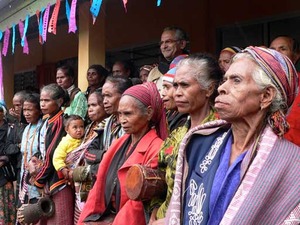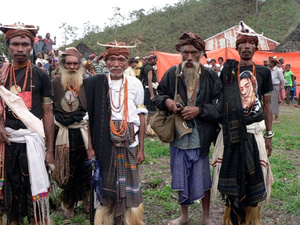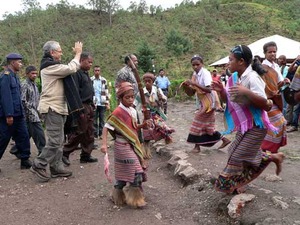
Drums tucked in the arms when played.
Singapore, 12 October 2010. Come end of October magical sounds will reverberate from the lofty peaks in Timor-Leste. For the first time, youths, tribes and mountain folk will hit their drums and blow their horns in a folk music festival happening where the sun rises – over the misty mountains.
If you are in Timor-Leste or planning a quick vacation, head up to Mount Ramelau for the inaugural traditional music festival from 26 to 30 October 2010. Nearly 30 cultural groups from 13 districts will come together to unite in one voice, singing, making music and dancing in the traditional, classical and modern genres.
Organiser Joel Maria Pereira said that the festival aims “to explore and promote the culture of the country, as well as to promote Ramelau as a tourist destination in Timor-Leste.”
The cultural bonanza is one in the series of ‘Dili City of Peace’ campaign initiated by President Jose Ramos Horta. The other events organised this year to promote peace and spur on tourism and social development were the Dili International Marathon, Tour de Timor and Dive Photo Contest.
Mount Ramelau Music Festival will be a delight to Timorese young and old alike, and foreigners. One music form is the Likurai, performed by women with drums during special occasions. This music was played in villages to welcome men returning home after serving in the war.

Letefoho tribal folks in Ermera district stand proud.
Ceremonial dances accompany music in full colourful costumes and headdress to welcome distinguished people. Youths, ladies and men get into the act, dancing barefoot, swinging their arms energetically and sometimes in circles. Percussion beats are rhythmic with little variation and are played at great lengths.
The festival is likely to showcase unique instruments such as the lakadou, kfui (a flute), karau dikur (cow horn), kaiket, babadok and tala (gong) – these can still be found throughout the country.
Timorese’ roots can be traced back to the early immigrants of Vedo-Australoid (40,000-20,000 BC), Melanesian (3,000 BC) and Proto-Malay (2,500 BC) origins.
Timor-Leste experienced significant cultural influences from Portugal (1515-1975) and Indonesia (1975-1999) due to their administrative rules over the country until Timor-Leste overthrew the brutal Indonesian occupation in 1999 and declared independence in 2002.
According to a newsletter by Hadahur, a music school there, much traditional music has vanished during the colonial and invasion periods - “a loss exacerbated since Independence with the greater access to the media,” adding that like the Timorese languages, the traditional music of Timor-Leste has to fight to survive. There are around 20 dialects spoken there, with Tetun being widely used.

Song and dance to welcome the President at Letefoho.
Age-old animism has been largely replaced by the Catholic faith, which is why choral music dominates the music scene in Dili today along with folk guitar, which is largely self-taught by the talented youths.
Based on the success of this year’s festival, Joel reckons that the country could take this musically-charged event up to regional levels next year.
Visit Timor-Leste during this festival and stay with the musicians up in the mountains. You will have an unforgettable rustic experience from the raw sounds that will be played from the hearts of these simple but culturally proud folks.
For more details, contact Joel at joel DOT riko AT gmail DOT com.
Related Articles on Gaia Discovery:
President Horta: Let's have an Asian Climate Change Summit
Fancy a trip up to Timor Leste? Read about the charms of Viqueque - caving, cockfights and plenty of soothing countrysides.
Travelling to Timor for Hilly Escapades
Getting There
Air Timor takes you from Singapore to Dili, the capital of Timor-Leste, twice a week, and soon three times a week via SilkAir. Flight time around three and half hours. Flight details:
MI 296 Singapore to Dili 0920 – 1415 hrs
MI 295 Dili to Singapore 1515 – 1800 hrs
There are also flights to Dili from Bali, Jakarta and Darwin.